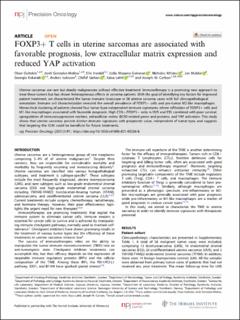| dc.contributor.author | Gultekin, Okan | |
| dc.contributor.author | Gonzalez-Molina, Jordi | |
| dc.contributor.author | Hardell, Elin | |
| dc.contributor.author | Moyano-Galceran, Lidia | |
| dc.contributor.author | Mitsios, Nicholas | |
| dc.contributor.author | Mulder, Jan | |
| dc.contributor.author | Kokaraki, Georgia | |
| dc.contributor.author | Isaksson, Anders | |
| dc.contributor.author | Sarhan, Dhifaf | |
| dc.contributor.author | Lehti, Kaisa | |
| dc.contributor.author | Carlson, Joseph W. | |
| dc.date.accessioned | 2023-02-24T07:36:31Z | |
| dc.date.available | 2023-02-24T07:36:31Z | |
| dc.date.created | 2021-12-02T15:56:41Z | |
| dc.date.issued | 2021 | |
| dc.identifier.issn | 2397-768X | |
| dc.identifier.uri | https://hdl.handle.net/11250/3053720 | |
| dc.description.abstract | Uterine sarcomas are rare but deadly malignancies without effective treatment. Immunotherapy is a promising new approach to treat these tumors but has shown heterogeneous effects in sarcoma patients. With the goal of identifying key factors for improved patient treatment, we characterized the tumor immune landscape in 58 uterine sarcoma cases with full clinicopathological annotation. Immune cell characterization revealed the overall prevalence of FOXP3+ cells and pro-tumor M2-like macrophages. Hierarchical clustering of patients showed four tumor type-independent immune signatures, where infiltration of FOXP3+ cells and M1-like macrophages associated with favorable prognosis. High CD8+/FOXP3+ ratio in UUS and ESS correlated with poor survival, upregulation of immunosuppressive markers, extracellular matrix (ECM)-related genes and proteins, and YAP activation. This study shows that uterine sarcomas present distinct immune signatures with prognostic value, independent of tumor type, and suggests that targeting the ECM could be beneficial for future treatments. | en_US |
| dc.language.iso | eng | en_US |
| dc.publisher | Springer Nature | en_US |
| dc.rights | Navngivelse 4.0 Internasjonal | * |
| dc.rights.uri | http://creativecommons.org/licenses/by/4.0/deed.no | * |
| dc.title | FOXP3+ T cells in uterine sarcomas are associated with favorable prognosis, low extracellular matrix expression and reduced YAP activation | en_US |
| dc.title.alternative | FOXP3+ T cells in uterine sarcomas are associated with favorable prognosis, low extracellular matrix expression and reduced YAP activation | en_US |
| dc.type | Peer reviewed | en_US |
| dc.type | Journal article | en_US |
| dc.description.version | publishedVersion | en_US |
| dc.source.volume | 5 | en_US |
| dc.source.journal | NPJ precision oncology | en_US |
| dc.source.issue | 1 | en_US |
| dc.identifier.doi | 10.1038/s41698-021-00236-6 | |
| dc.identifier.cristin | 1963688 | |
| cristin.ispublished | true | |
| cristin.fulltext | original | |
| cristin.qualitycode | 1 | |

